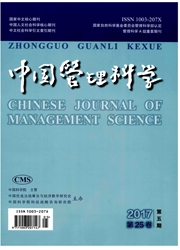

 中文摘要:
中文摘要:
基于纳什谈判模型,研究零售商谈判实力不断增强下自有品牌产品质量纵向合作策略选择问题,分别对零售商不承担产品质量成本投入的保守型策略,零售商完全承担产品质量成本投入的冒险型策略以及零售商部分承担产品质量成本投入的老练型策略进行研究,获得上述三种策略下产品最优质量、供应链最优总利润以及各成员最优利润的纳什谈判均衡解。在此基础上,给出上述各策略的比较,数值分析以及老练型策略的一种修正。研究表明:1)随着零售商谈判实力的增强,保守型策略可能引发自有品牌产品质量"双重边际效应"问题;2)老练型策略虽可实现与谈判实力无关且等价于纵向集中控制下的最佳产品质量协同,但零售商并非总具备谈判实力条件;3)基于良好协商谈判的老练型策略的修正即可实现最佳的产品质量协同,又同时是各方的占优策略选择。
 英文摘要:
英文摘要:
Based on the Nash negotiation model, the strategy of the retailers' private brand product quality vertical cooperation is studied under the increase of the retailers' negotiations power, three types of prod- uct quality vertical collaboration are investigated, which are the conservative type strategy that retailer does not bear product quality cost, the adventure type strategy that retailer bear product quality cost completely and the sophisticated type strategy that retailer bear parts of the product quality cost, the Nash negotia- tions equilibrium solution of the optimal product quality, the optimal supply chain total profit and the opti- mal participants profit are obtained. And on this basis, the comparison of strategies above, numerical anal- ysis, and the modification of the sophisticated type strategy are provided. The study shows that. 1)the conservative type strategy may even cause the double marginalization effect of the private brand quality with the increase of retailer negotiation power; 2)retailers do not always have the suitable conditions of ne- gotiation strength to adopt the sophisticated type strategy, although it can realize the best product quality which is equivalent to the vertical integration control and negotiation power independent; 3)the modifica- tion strategy of the sophisticated type base on good will of negotiation proposed not only can realize best product quality coordination, but also can be the dominant strategy of retailer and manufacture.
 同期刊论文项目
同期刊论文项目
 同项目期刊论文
同项目期刊论文
 期刊信息
期刊信息
